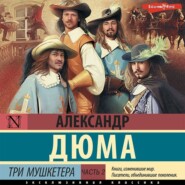По всем вопросам обращайтесь на: info@litportal.ru
(©) 2003-2024.
✖
The Sicilian Bandit
Настройки чтения
Размер шрифта
Высота строк
Поля
At this instant Pascal Bruno saw the muskets of a second troop descending the mountain: they advanced in so direct a line towards the isolated olive-tree, at the foot of which lay the body of Placido, that it was evident it was the appointed place of rendezvous.
Those who marched first stumbled over the corpse. Upon this they formed a circle round it; but no one could recognise it, the teeth of Lionna had so much disfigured it; however, as it was at this olive-tree Placido had appointed a meeting, and as the body was at its foot, and no other living being in the neighbourhood, it was evident that the dead man was Placido himself.
The soldiers accordingly guessed that their plot had been discovered, and, consequently, that Bruno was on his guard; they, therefore, began to consider how they should act.
Pascal, standing at the window, watched all their movements; but the moon issuing suddenly from behind a cloud, a ray of light fell upon his figure, and one of the soldiers seeing him, pointed him out to his comrades.
"The bandit! the bandit!" was heard from all the troops, and a volley of shot was instantly poured in at the window.
A few of the balls flattened themselves against the wall, others whistled past the ears and over the head of the party at whom they were directed, and lodged in the mouldings of the ceiling.
Pascal replied by discharging four muskets in succession as they were handed to him by Ali: four men fell.
The soldiers, who were not troops of the line, but a kind of national guard organised for the protection of the high road, hesitated a little when they saw death pay them so sudden a visit; for all the men, reckoning on Placido's treason, had entertained the hope of making an easy capture: instead of which, it was now evident that it was an absolute siege they were about to undertake, and they were in want of everything necessary for that purpose.
The walls of the little fortress were lofty, and the gates strong – they had neither ladders nor hatchets. There was, however, the possibility of killing Pascal while at the window levelling his musket; but this seemed but a poor chance to men who believed their adversary was invulnerable.
Accordingly, the most prudent manouvre seemed to be to retire out of gunshot and deliberate on their future proceedings; but their retreat was not rapid enough to prevent Pascal Bruno despatching two more messengers of death after them.
Pascal, perceiving that the siege was raised for an instant, went to the opposite window that overlooked the village: the discharge of the muskets had attracted the attention of the first party, so that he had scarcely shown himself at the opening when he was saluted with a shower of bullets; but the same miraculous good luck again preserved him. It seemed like enchantment: while, on his side, every shot he fired told upon the soldiers, and Pascal was made aware of his success by the oaths they uttered.
A similar occurrence happened to this troop as to the other; its ranks were thrown into disorder, but, instead of taking to flight, they stood up close against the walls of the fortress, and by this manouvre they made it impossible for Bruno to fire without thrusting half his body out of the window; and, as the bandit thought it impolitic to expose himself to unnecessary danger, the firing in consequence of this mutual act of prudence ceased for an instant.
"Have we got rid of them?" asked the Maltese; "may we cry Victory!"
"Not yet," observed Bruno, "it is only a suspension of arms; the enemy have, no doubt, gone to the village to procure ladders and hatchets; we shall, no doubt, soon have news of them. But make yourself easy," continued the bandit, filling two glasses; "as we cannot remain quiet with them, we must give them something in return. Ali, go and fetch a barrel of powder. – Here's to your health, captain!"
"What are you going to do with the powder?" asked the Maltese, with an uneasy look.
"Oh! not much; but you shall see!" replied Bruno. Ali entered the room, bearing on his shoulder the barrel of gunpowder.
"That's right," said Bruno; "now take a gimlet and make a hole in the barrel."
Ali obeyed with the passive readiness that was the distinctive mark of his devotion to Bruno.
While this was going on, Pascal tore up a napkin into strips, which he tied together, and rolled them in the powder he took out of a cartridge; he then put this match into the hole Ali had made in the barrel, and closed it with wet powder, which had the effect also of keeping the match in its place. He had scarcely finished his preparations when the sound of a hatchet was heard at the gate.
"Am I a good prophet?" said Bruno, as he rolled the barrel towards the door of the chamber which overlooked a staircase leading to the castle court, and then going back to fetch a piece of lighted fir from the fire.
"Ah!" said the Maltese, "now I begin to understand what you are going to do."
"Father," said Ali, "they are coming from the mountain with ladders."
Bruno ran to the window from which he had fired in the first instance and plainly saw his adversaries, who had procured the scaling implement they so much needed, and, ashamed of their first retreat, were returning to the charge with renewed confidence.
"Are the guns loaded?" asked Bruno.
"Yes, father," replied Ali, handing him a carbine.
Bruno, without looking back, took the gun the boy offered him, slowly brought it to his shoulder, and levelled with more care than he had yet exhibited; he fired, and one of the two men who carried the ladder fell.
Another man took his place, and Bruno took a second musket: the other soldier fell by the side of his comrade.
Two other men succeeded those who were killed and fell in their turn; upon this the scaling party, leaving their ladder, retired a second time, after firing another volley as useless as their previous discharges.
In the meantime, those who were besieging the gate redoubled their blows, and the dogs on their side barked furiously; every moment the blows became more violent and the barking fiercer. At length, one side of the gate was forced in and two or three men entered by the opening; and by the cries of distress they uttered, their comrades judged that they had fallen into the hands of more terrible enemies than they had calculated on; but they could not fire upon the dogs without the risk of killing the men.
After a short time, one party of the besiegers had entered through the door one after the other; the court was soon filled, and then began a combat, like one of those that were exhibited in the ancient circus, between the soldiers and the four monstrous dogs, who fiercely defended the narrow staircase that led to the first floor of the fortress. Suddenly, the door at the top of the staircase opened, and the barrel of powder Bruno had prepared bounded from stair to stair and exploded like a bombshell in the midst of the combatants.
The explosion was terrible; one of the walls fell in ruins, and everything in the court-yard was blown to atoms.
The besiegers were for an instant stupefied; but in the meantime the two troops had united themselves, and presented an effective force of more than 300 men. A deep feeling of shame overwhelmed the multitude when they saw themselves kept in check by a single man.
The leaders took advantage of this feeling to encourage them, and a breach having been made by the fall of the wall, they marched up to it in a body in good order, and having cleared every obstacle, they spread themselves over the whole of the court-yard and were soon before the staircase.
When they reached this spot, there was another moment of hesitation: at length some of them, encouraged by their comrades, began to ascend the stairs, the rest of the party following. The staircase was soon carried; but those who were at the head would soon have felt an inclination to retreat if it had been possible; this, however, was no longer the case – they were obliged, therefore, to attempt the door, which yielded without resistance.
The besiegers, uttering shouts of triumph, ran round the first chamber; but at that instant the door of the second room opened, and the soldiers perceived Bruno seated on a barrel of gunpowder, a pistol in each hand, while the terrified Maltese rushed through the open, doorway crying out, in accents so full of truth and terror as to leave no doubt on the subject: —
"Stand back! stand back!" he cried, "the fortress is mined; if you advance another step we shall all be blown to atoms!"
The door was closed as if by enchantment, and the shouts of victory were changed into cries of terror. The whole body of the besiegers might have been seen precipitating themselves down the narrow staircase that led to the court-yard – some among them leaped through the windows – it seemed as if every man felt the ground tremble beneath his feet, and at the end of five minutes Bruno was again master of his fortress.
As to the Maltese, he took advantage of the opportunity and left the castle.
Pascal, no longer hearing any sound, arose and went to the window. The siege had been converted into a blockade; a guard was placed at every opening, and the men who performed this duty had sheltered themselves from the bandit's fire behind carts and barrels. It was evident that a new plan for carrying on the campaign had been adopted.
"So it seems they intend to starve us out," observed Bruno.
"The dogs!" exclaimed Ali.
"Do not insult the poor beasts who died while defending us, call them men – men!" said Bruno, smiling sarcastically.
"Father!" said Ali.
"Well, my boy," said Bruno, kindly.
"Do you not see?" said Ali.
"What?" asked Bruno.
"That light!"
"Ay, truly," said Bruno; "what can it mean? It cannot be daybreak yet; and, besides, it comes from the north, and not the east."
"The village is on fire!" exclaimed Ali.
"By heavens you are right!" said Bruno.

















